Reasons and Reason Groups
Return reasons are the reasons that a customer is returning something (straightforward, right?). As a customer navigates through the return process, they will select a return reason and reason detail that best aligns with why they are returning the product.
Although Corso comes with a default list, you can customize your reasons by:
- Adding new reasons
- Deleting existing reasons
- Adding/removing reason details
Reason Management
Section titled “Reason Management”The different processes for managing reasons and reason groups can be reviewed here.
Adding Reasons
Section titled “Adding Reasons”-
Navigate to Settings > Reasons > + Add Reason
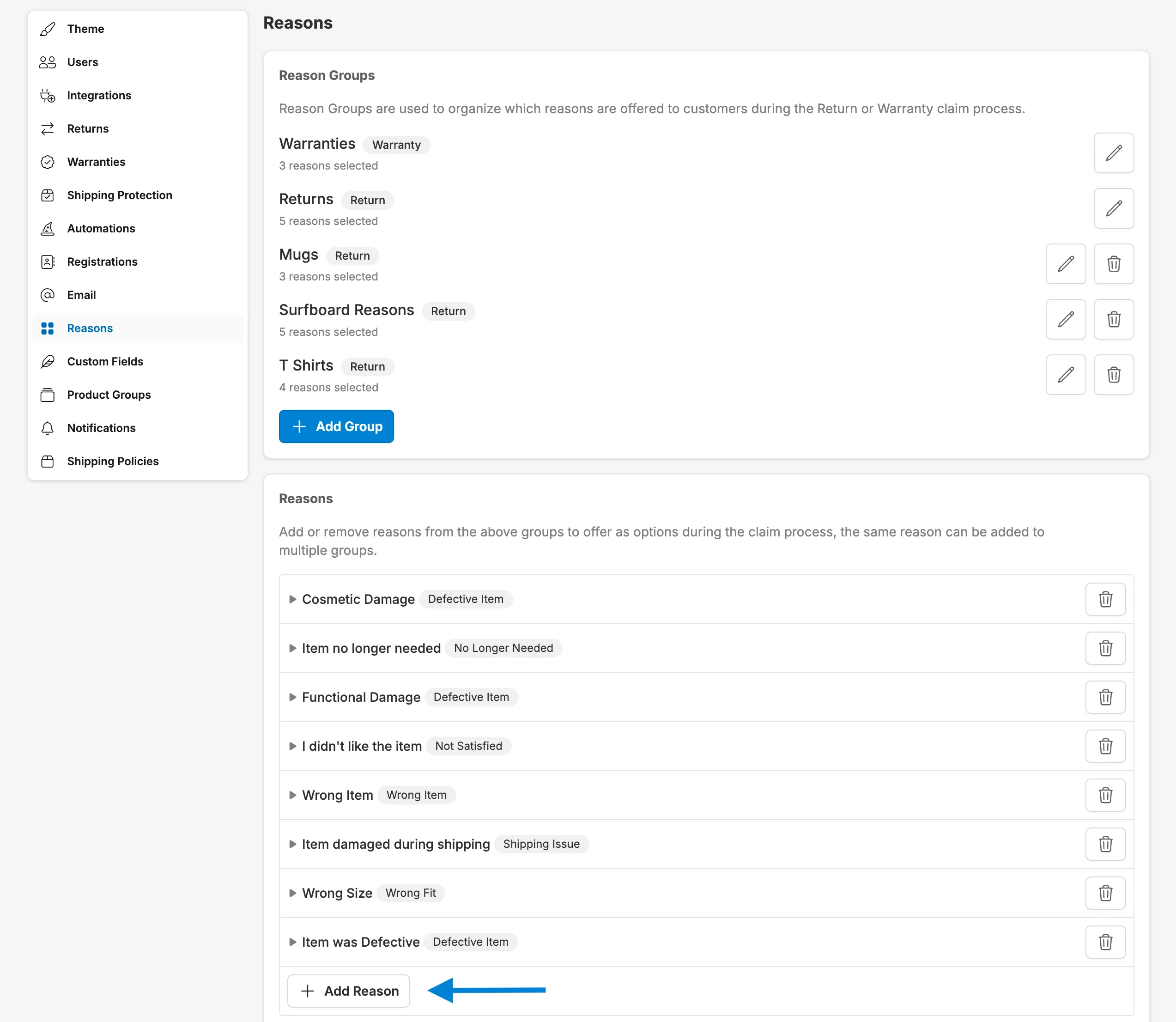
-
Once you have entered a reason name and selected a category, click the ’+’ to add the reason
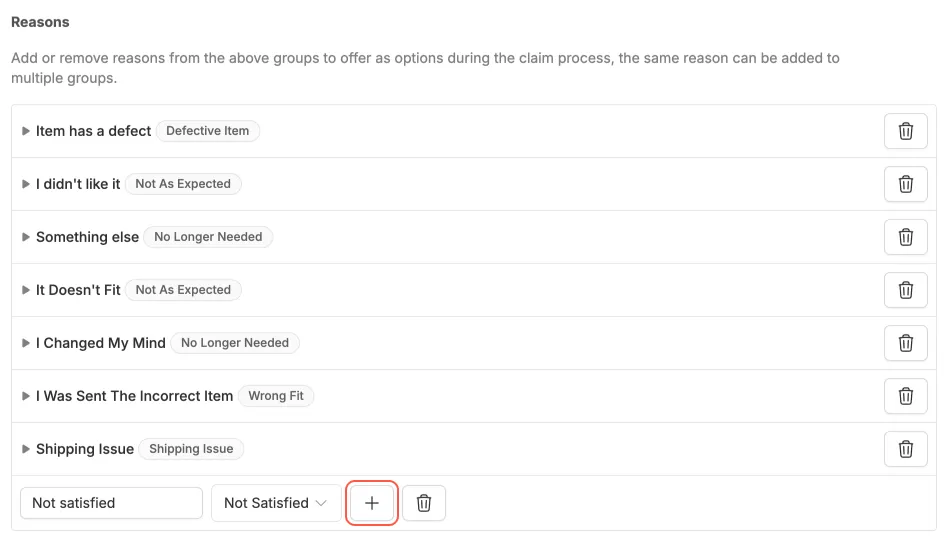
Deleting Reasons
Section titled “Deleting Reasons”-
Hover over the reason you want to delete and click the trash can
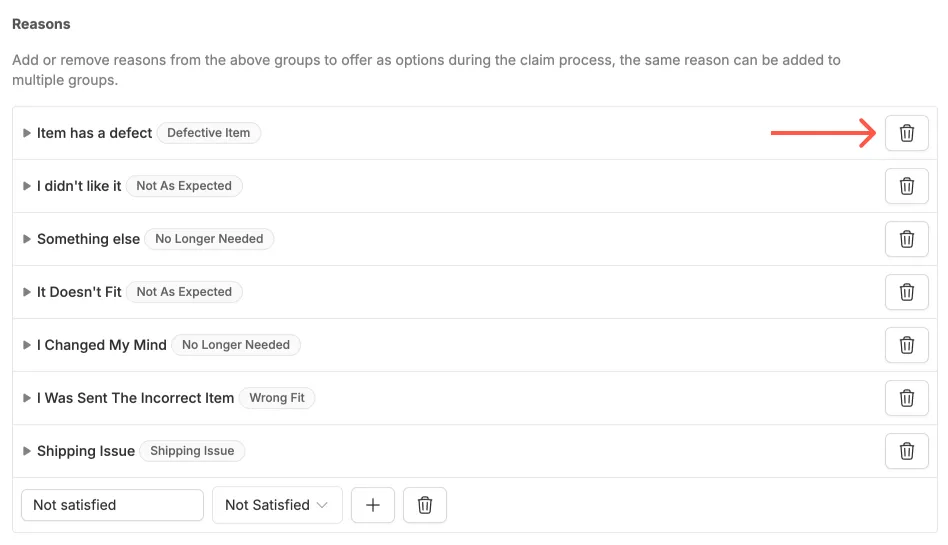
Reason Details
Section titled “Reason Details”-
Click on any reason you want to add a reason detail to
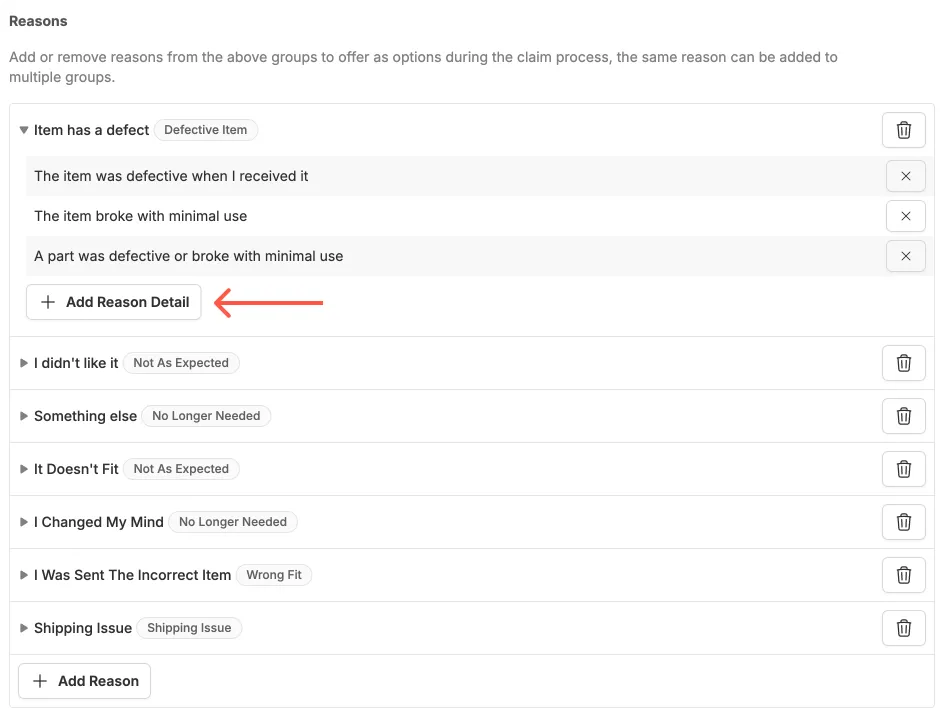
-
Enter reason detail name and click the ’+’ to add
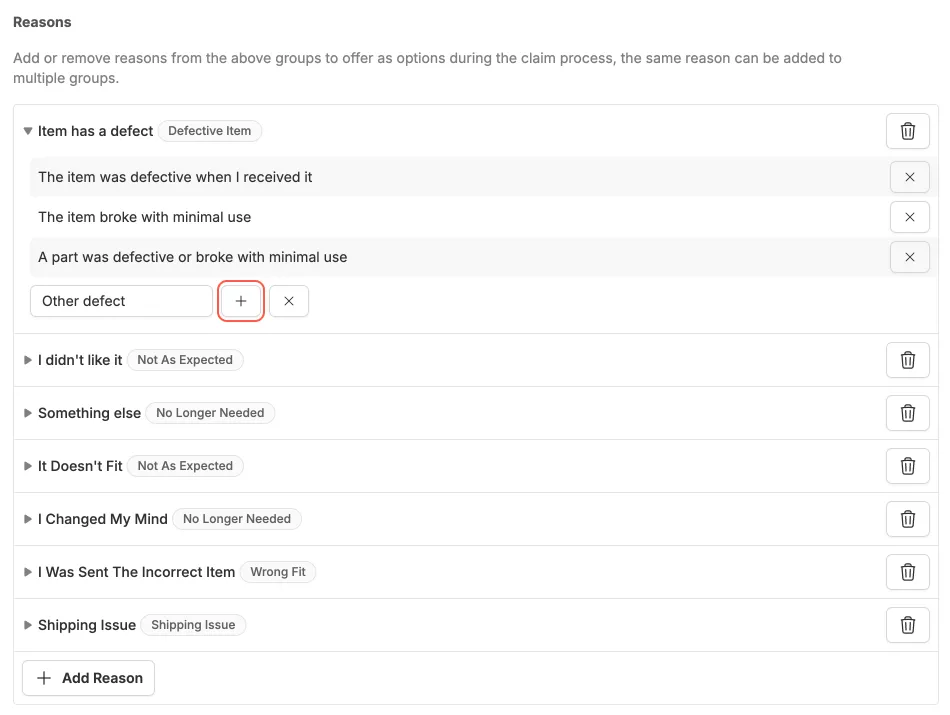
The Customer View
Section titled “The Customer View”Once set up, the customer will see the reasons and reason groups as follows:
-
Once they’ve chosen a product to return, they will see the list of reasons
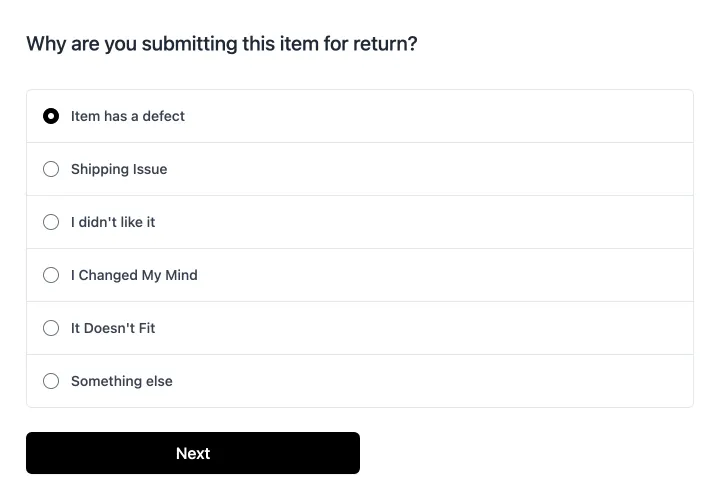
-
After they select a reason and click next, they will see the details associated to the return reason they selected
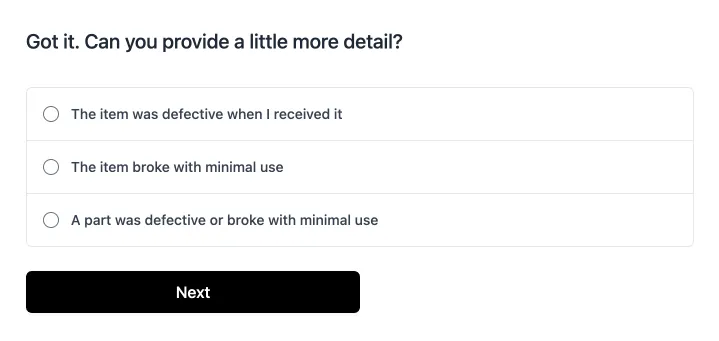
Reason Groups
Section titled “Reason Groups”Reason groups provide flexibility to offer reasons specific to the type of claim a customer is creating (Return or Warranty). Corso provides default groups for both claim types, which can both be customized as needed. You can also create new groups where you can choose the claim type, reasons and product group (see What are Product Groups?).
What determines the Claim Type?
Section titled “What determines the Claim Type?”Claim type is determined by the return window and warranty window set in your Returns and Warranties settings. The return window is based on the windows set for Refunds, Store Credit and Variant Exchanges. The warranty window is set in warranty settings.
Example 1: Your Return window is set for 30 days (refunds, store credit, variant exchange), and your warranty window is set for 365 days. A customer goes to return a product they didn’t like after 15 days. Because this claim is being created within the return window, this would be a return claim.
Example 2: Your return window is still set for 30 days and your warranty window is set for 365 days. A customer goes to return a product after 45 days. Because they are outside of the return window you have set in the Corso app, they would be submitting a warranty claim.
Because returns and warranties need to be handled differently, being able to apply reason groups by claim type allows brands to set choose different reasons to display when they submitting a return claim versus a warranty claim.
Adding a Reason Group
Section titled “Adding a Reason Group”-
Navigate to Settings > Reasons > + Add Group
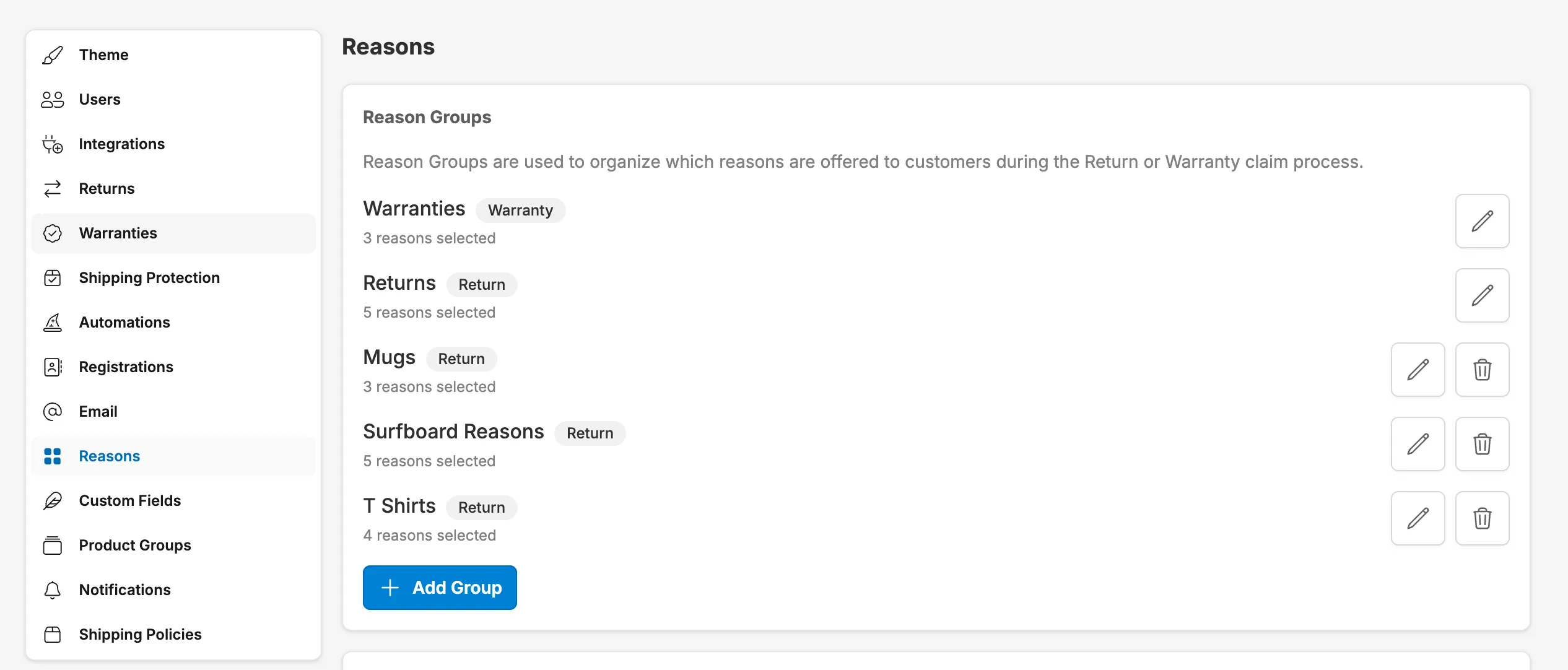
-
Add a Group Name and select a Claim Type, Product Group (optional) and the Reasons you want included in the group

Requiring Product Groups
Section titled “Requiring Product Groups”Why are product groups required when creating a new reason group?
Product groups allow brands to show specific reasons to a customer returning or exchanging a product included in that given product group. These groups are created using the product tags and product types set in Shopify. Once a product group has been created, it’s available to select from the product group drop down when creating a reason group.
Real World Example:
Section titled “Real World Example:”- Default Return Group Reasons: Wrong Size, Other Warranty Issue (please describe), Cosmetic Damage, Functional Damage, Item no longer needed, Wrong item, I didn’t have a good experience, Item not as described, I didn’t like the item, Item damaged during shipping
- Custom Reason Group:
- Group Name: Backpacks
- Claim Type: Returns
- Product Group: Backpacks
- Reasons: Item not as expected, I didn’t like the item, Item no longer needed
- Scenario: A customer buys a backpack and a shirt. They need to return the backpack because they found a better price elsewhere, and need to exchange the shirt for a different size.
- Backpack Return
- They look up the order in the customer portal and select the backpack as the item they need to return (they are returning within the return window set in the Corso)
- Reasons they’ll see: Item not as expected, I didn’t like the item, Item no longer needed
- Shirt Exchange
- They select the shirt they want to exchange for a different size
- Reasons they will see: Wrong Size, Other Warranty Issue (please describe), Cosmetic Damage, Functional Damage, Item no longer needed, Wrong item, I didn’t have a good experience, Item not as described, I didn’t like the item, Item damaged during shipping
- Backpack Return
- Key Takeaway: Product groups allow brands to show specific reasons to a customer returning or exchanging a product included in that given product group.